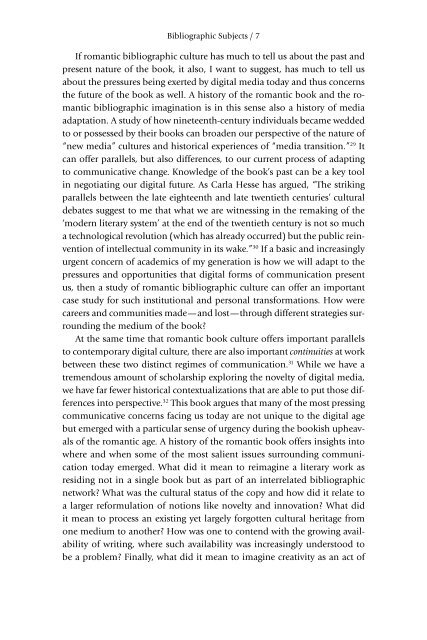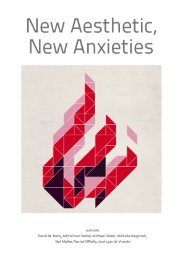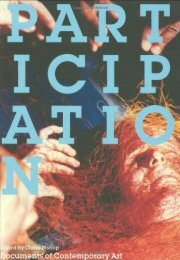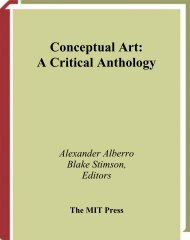Dreaming in Books - uncopy
Dreaming in Books - uncopy
Dreaming in Books - uncopy
Create successful ePaper yourself
Turn your PDF publications into a flip-book with our unique Google optimized e-Paper software.
Bibliographic Subjects / 7<br />
If romantic bibliographic culture has much to tell us about the past and<br />
present nature of the book, it also, I want to suggest, has much to tell us<br />
about the pressures be<strong>in</strong>g exerted by digital media today and thus concerns<br />
the future of the book as well. A history of the romantic book and the romantic<br />
bibliographic imag<strong>in</strong>ation is <strong>in</strong> this sense also a history of media<br />
adaptation. A study of how n<strong>in</strong>eteenth- century <strong>in</strong>dividuals became wedded<br />
to or possessed by their books can broaden our perspective of the nature of<br />
“new media” cultures and historical experiences of “media transition.” 29 It<br />
can offer parallels, but also differences, to our current process of adapt<strong>in</strong>g<br />
to communicative change. Knowledge of the book’s past can be a key tool<br />
<strong>in</strong> negotiat<strong>in</strong>g our digital future. As Carla Hesse has argued, “The strik<strong>in</strong>g<br />
parallels between the late eighteenth and late twentieth centuries’ cultural<br />
debates suggest to me that what we are witness<strong>in</strong>g <strong>in</strong> the remak<strong>in</strong>g of the<br />
‘modern literary system’ at the end of the twentieth century is not so much<br />
a technological revolution (which has already occurred) but the public re<strong>in</strong>vention<br />
of <strong>in</strong>tellectual community <strong>in</strong> its wake.” 30 If a basic and <strong>in</strong>creas<strong>in</strong>gly<br />
urgent concern of academics of my generation is how we will adapt to the<br />
pressures and opportunities that digital forms of communication present<br />
us, then a study of romantic bibliographic culture can offer an important<br />
case study for such <strong>in</strong>stitutional and personal transformations. How were<br />
careers and communities made—and lost—through different strategies surround<strong>in</strong>g<br />
the medium of the book?<br />
At the same time that romantic book culture offers important parallels<br />
to contemporary digital culture, there are also important cont<strong>in</strong>uities at work<br />
between these two dist<strong>in</strong>ct regimes of communication. 31 While we have a<br />
tremendous amount of scholarship explor<strong>in</strong>g the novelty of digital media,<br />
we have far fewer historical contextualizations that are able to put those differences<br />
<strong>in</strong>to perspective. 32 This book argues that many of the most press<strong>in</strong>g<br />
communicative concerns fac<strong>in</strong>g us today are not unique to the digital age<br />
but emerged with a particular sense of urgency dur<strong>in</strong>g the bookish upheavals<br />
of the romantic age. A history of the romantic book offers <strong>in</strong>sights <strong>in</strong>to<br />
where and when some of the most salient issues surround<strong>in</strong>g communication<br />
today emerged. What did it mean to reimag<strong>in</strong>e a literary work as<br />
resid<strong>in</strong>g not <strong>in</strong> a s<strong>in</strong>gle book but as part of an <strong>in</strong>terrelated bibliographic<br />
network? What was the cultural status of the copy and how did it relate to<br />
a larger reformulation of notions like novelty and <strong>in</strong>novation? What did<br />
it mean to process an exist<strong>in</strong>g yet largely forgotten cultural heritage from<br />
one medium to another? How was one to contend with the grow<strong>in</strong>g availability<br />
of writ<strong>in</strong>g, where such availability was <strong>in</strong>creas<strong>in</strong>gly understood to<br />
be a problem? F<strong>in</strong>ally, what did it mean to imag<strong>in</strong>e creativity as an act of








